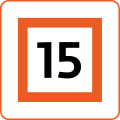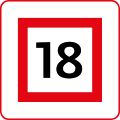| Classification | Appropriate age | Description | Year implemented | Observations | Movies |
|---|
 | All ages | Allowed for all ages | 1994 | Replaces classification 5. | Fantasia 2000 , Cars , The Wizard of Oz , Cars 3 , Black Cat Detective [a] (only in IMDb) |
 | 6 years or older | Allowed for anyone 6 years of age or older. Children under 6 years old can watch it in movie theaters if they are accompanied by an adult | 2015 | Replaces classification 7 [b] | Incredibles 2 , Cars 2 , Despicable Me 3 , The Good Dinosaur , Toy Story, Frozen , Cars 3 , The Simpsons Movie , The Lego Movie , Rango , Zootopia |
 | 9 years or older | Children under 9 years old can watch it in movie theaters if they are accompanied by an adult | 2015 | Replace the rating 11 along with the rating 12. | Ford v Ferrari , Goosebumps 2: Haunted Halloween , Spider-Man: Into the Spider-Verse , Beauty and the Beast , Ghostbusters , Star Wars: Episode V - The Empire Strikes Back , Casablanca |
 | 12 years or older | Children under the age of 12 can watch it in movie theaters if they are accompanied by an adult. | 1954 | Abolished in 1994 and replaced by rating 11, but it was re-implemented in 2015 as a replacement for rating 11. | Avengers: Endgame , Spider-Man: Homecoming , 2012 , Pirates of the Caribbean: Dead Man's Chest , Mortal Kombat (Netflix), 10,000 BC, Spider-Man 2 (Re-classification), Star Wars: Episode II - Attack of the Clones (re-classification), Oblivion, Batman v Superman: Dawn of Justice , Vacation |
 | 15 years or older | Young people under the age of 15 can see it in movie theaters if they are accompanied by an adult. | 1988 | Replaces classification 16. | 1917, The Mechanical Orange (re-classification), Cars 2 (2020 re-classification in Bergen, Tromsø and Svalbard), The Godfather (only in iTunes), The Godfather II (re-classification), An American Werewolf in London , Final Destination , Teenage Mutant Ninja Turtles , World War Z , Cold Prey 2 , Fast Five |
 | 18 years or older | Absolute lower limit. In cinemas, everyone who is present must be at least 18 years old. | 1970 | It also applies to films that must be presented in theaters, but that are not presented for classification by the NMA. | |






